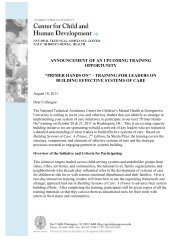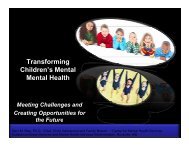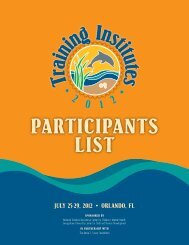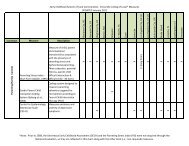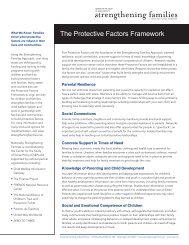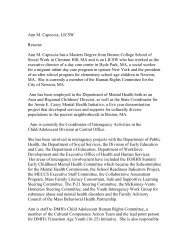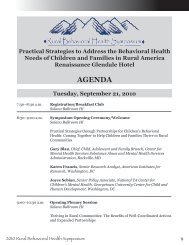Training Institutes 2012 - National Technical Assistance Center for ...
Training Institutes 2012 - National Technical Assistance Center for ...
Training Institutes 2012 - National Technical Assistance Center for ...
Create successful ePaper yourself
Turn your PDF publications into a flip-book with our unique Google optimized e-Paper software.
During this Institute, participants will see a demonstration of the futures planning process and will have the opportunity<br />
to practice graphic facilitation techniques through team role play activities. Video clips of RENEW meetings and<br />
problem solving examples will also be included.<br />
The faculty team <strong>for</strong> the session will offer the perspectives of a youth who first experienced the RENEW model 3 years<br />
ago and who continues to access her social support network; a RENEW facilitator who has worked in school and mental<br />
health settings and who now teaches others to become facilitators and the model developer and researcher who has<br />
structured the RENEW training process, manual, evaluation, and fidelity tools.<br />
MODERATOR/PRESENTER: JoAnne Malloy, Ph.D., Assistant Clinical Professor, Institute on Disability, University<br />
of New Hampshire, Concord, NH<br />
Kelsey Carroll, Young Adult, Concord, NH<br />
Jonathon Drake, M.S.W., RENEW Project <strong>Training</strong> Manager, Institute on Disability, University of New Hampshire,<br />
Concord, NH<br />
INSTITUTE #9 1:30 PM THURSDAY • 8:30 AM SATURDAY • SUN 4-5-6<br />
Strategies <strong>for</strong> a Family-Driven, Youth-Guided Approach in Policy and Practice<br />
INSTITUTES<br />
OBJECTIVES—Participants will learn:<br />
1. To describe the family-driven, youth-guided approach to policy and practice and explain how it affects outcomes <strong>for</strong><br />
children and youth involved in child-serving systems<br />
2. To explain the importance of “perspective taking” when working with families<br />
3. How to be strengths-based<br />
4. Effective strategies <strong>for</strong> implementing a family-driven and youth-guided approach at both the system and service<br />
delivery levels, including concrete examples in all aspects of work with families<br />
5. To develop action steps to implement family-driven care upon return to their communities<br />
This Institute will focus on the core system of care value of family-driven, youth-guided approaches in policy and in<br />
service delivery. Faculty will lead participants through an examination of their current practices, the meaning of familydriven,<br />
youth-guided care and will provide concrete techniques <strong>for</strong> infusing this approach into their work at all levels.<br />
Using real life experiences from the field and techniques learned through training and practice, the faculty will provide<br />
strategies <strong>for</strong> meaningfully involving parents and youth as partners, recognizing their expertise regarding their families,<br />
and incorporating parent/youth voice as a critical part of policy development, evaluation of services, and program design.<br />
The in<strong>for</strong>mation and strategies to be highlighted are based on the experience of Tennessee Voices <strong>for</strong> Children (TVC)<br />
and its family support staff. As Tennessee’s statewide family organization, TVC has been a partner in five system of care<br />
sites working with many entities and systems to implement family-driven care at the service provision and policy levels.<br />
The Institute is designed to in<strong>for</strong>m the work of others to operationalize this value.<br />
Specific topics to be covered include:<br />
• An examination of the meaning of family-driven care and participants’ current approaches<br />
• How a family-driven approach impacts work with families and can improve outcomes<br />
• The importance of perspective taking and being strengths-based in work with families and the reasons why being<br />
truly family-driven can be difficult to accomplish<br />
• Specific, concrete strategies to address barriers and to be family-driven in policy, agency procedures, service<br />
provision, program design, and interactions with other systems<br />
• An opportunity to develop action steps specific to each participant’s role in their community to implement a familydriven,<br />
youth-guided approach in their home communities and states<br />
<strong>Training</strong> <strong>Institutes</strong> <strong>2012</strong><br />
41



